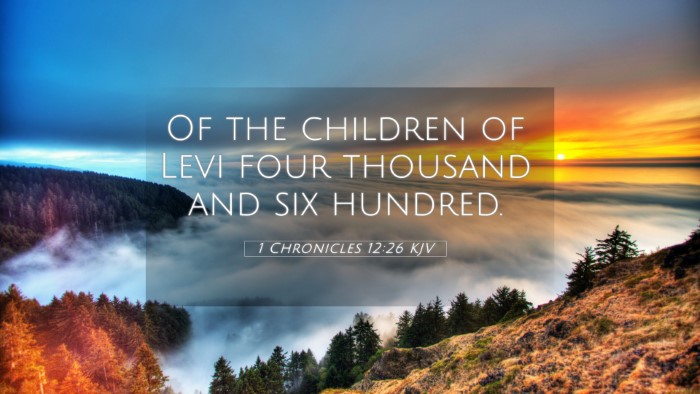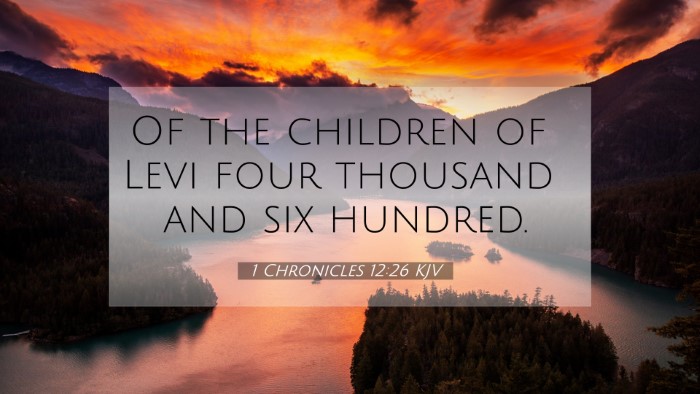Understanding 1 Chronicles 12:26
Verse: "Of the children of Levi four thousand and six hundred."
Verse Context
This verse is part of a broader narrative in 1 Chronicles that provides a genealogical account of the different tribes of Israel, particularly in the context of their support of David during his rise to kingship. Understanding this verse involves looking at the significance of the Levites, their role in Israel, and their numbers during the time of David's reign.
Commentary Insights
This verse offers a glimpse into the structure and organization of the Israelite tribes, highlighting the Levites' vital role as the priestly class. The specific mention of "four thousand and six hundred" emphasizes their considerable number as they gathered to support David. Below are combined insights from public domain commentaries:
-
Matthew Henry: Henry points out that the Levites were dedicated to service and worship in the tabernacle. Their loyalty to David signifies the divine favor upon David's kingship. The number highlights both their commitment and the importance of their role as spiritual leaders within Israel.
-
Albert Barnes: Barnes explains that the Levites' numbers vary throughout Biblical history, but this specific count reflects their unity and purpose in supporting God's chosen king. This unification under David's banner supports the theme of divine order and the centrality of worship in governance.
-
Adam Clarke: Clarke emphasizes that the Levites' service extended beyond mere numbers; they symbolize God's covenant with Israel. Their presence in David's following indicates a restoration of proper worship practices during a time of transition in leadership.
Bible Verse Cross-References
To deepen the understanding of 1 Chronicles 12:26, we can explore several Bible verse cross-references that relate to the themes of leadership, the Levites, and the governance of Israel:
- Numbers 1:47-54: This passage outlines the census of the Levites, their unique role, and duties.
- 1 Chronicles 6:48-49: Details the Levitical cities and the responsibilities given to the Levites.
- 2 Samuel 15:24-26: Highlights the importance of the Levites in the support of David during his reign and shows their involvement in national and religious matters.
- Exodus 32:26-29: Illustrates the Levites' commitment to God during the golden calf incident, reinforcing their role as a dedicated tribe.
- Deuteronomy 10:8-9: States the Lord set apart the tribe of Levi to bear the Ark of the covenant, emphasizing their priestly duty.
- Joshua 21:3: Discusses the cities of the Levites and their significance in the land given to Israel.
- Hebrews 7:11-14: Makes a theological connection to Christ as a priest in the order of Melchizedek, reflecting on the significance of Levitical priesthood.
- Psalms 78:68-69: Describes God's choice of the tribe of Judah and Mount Zion for his sanctuary, relating to the larger theme of worship and leadership.
- 1 Chronicles 15:12-15: Chronicals the Levites' preparation to carry the Ark, demonstrating their active role in worship and leadership under David.
- 1 Peter 2:9: Refers to believers as a royal priesthood, linking the secular leadership of David with the spiritual leadership of Christ and His followers today.
Thematic Connections in Bible Verses
By cross-referencing the themes found in 1 Chronicles 12:26, readers can uncover rich inter-Biblical dialogues concerning leadership, worship, and fidelity to God's commands:
-
Leadership: David's kingship was characterized by the support of various tribes including the Levites, reflecting the biblical principle of leading with the counsel and backing of respected individuals within the community.
-
Worship: The Levites were integral in worship and sacrifice, which is echoed throughout the Psalms and prophecies of the Old and New Testaments.
-
Covenant Relationship: The Levites are a constant reminder of God's covenant with Israel, paralleling the New Covenant established through Jesus, where believers are seen as a spiritual priesthood.
-
Unity: Their collective commitment to David symbolizes the need for unity in the body of Christ today, as highlighted in various New Testament epistles.
-
Role of Prayer and Sacrifice: The Levites' duties included prayer and sacrifices, which are foundational aspects of Christian worship depicted in the New Testament book of Hebrews.
-
Divine Selection: The choice of the Levites reminds us of God's sovereign choices throughout scripture, guiding His people towards His divine purposes.
-
Historical Context: The recording of numbers and genealogies demonstrates the significance of historical context in understanding God's interaction with humanity.
-
Faithfulness: The Levites' loyalty exemplifies the call for believers today to remain faithful amid changing leadership and societal challenges.
-
Priestly Functions: The transformation of the priesthood from the Levites to the order of Melchizedek signifies the completion of God's salvation plan through Christ, linking Old and New Testament revelations.
-
Scriptural Consistency: The Levites' number serves as an example of God’s meticulous nature in His dealings, which resonates deeply with the theme of divine order evident throughout the scriptures.
Conclusion
1 Chronicles 12:26 serves as an important reminder of the role the Levites played in supporting David and maintaining the worship of Yahweh during a theologically and politically significant time in Israel's history. By examining the cross-references and thematic connections, readers can gain a deeper understanding of biblical leadership and worship, drawing lessons applicable to contemporary faith journeys.


